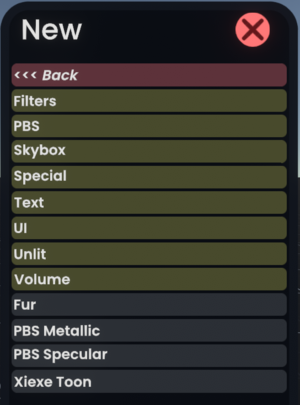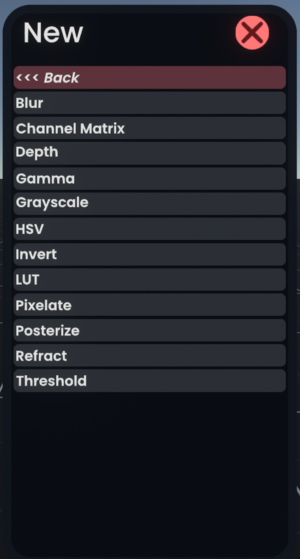No edit summary |
m +Category:Materials with sort key "*" Tag: 2017 source edit |
||
| (5 intermediate revisions by 3 users not shown) | |||
| Line 1: | Line 1: | ||
<!--T:1--> | <!--T:1--> | ||
A Material is an [[Asset|asset]] type used for rendering visuals in Resonite. The type of material and its properties determine the look of the object and how it interacts with lighting in the scene. | A '''Material''' is an [[Asset|asset]] type used for rendering visuals in [[Resonite]]. The type of material and its properties determine the look of the object and how it interacts with lighting in the scene. | ||
<!--T:2--> | <!--T:2--> | ||
Materials can be represented as physical objects called ''' | Materials can be represented as physical objects called '''material orbs''', which can be applied to meshes with the [[Material Tool|material tool]], or using the [[Scene Inspector Dialog|inspector]]. Material orbs are only a visual representation and aren't necessary for the material to function. | ||
<!--T:3--> | <!--T:3--> | ||
Each | Each material acts like any other component but is driven by an underlying [[Shader|shader]]. Each material contains a unique shader and a list of properties that can be modified. By editing a material's properties, you can change the look and feel of your objects within Resonite. Resonite has a large variety of material types which are listed below. | ||
== Custom Materials / Shaders == <!--T:4--> | == Custom Materials / Shaders == <!--T:4--> | ||
Resonite currently does not support custom | Resonite currently does not support [[Custom Shaders|custom shaders]]; this feature is on Resonite's [[Roadmap|roadmap]] once the game's rendering engine is replaced with a custom solution. While you're waiting for custom shaders, try out Resonite's existing shaders which can achieve most visual effects when combined with [[Components|components]]/[[ProtoFlux]] or stacking multiple mesh renderers together via [[Material Stacking]]. | ||
== Material Documentation == <!--T:8--> | == Material Documentation == <!--T:8--> | ||
Resonite uses many standard shaders with some custom ones requested by the community. If you want any sort of documentation, using the following link would be ideal until a more custom renderer is fleshed out. [https://docs.unity3d.com/Packages/com.unity.render-pipelines.universal@7.1/manual/shading-model.html Shading models in Universal Render Pipeline] | |||
=== Material Specific Information === <!--T:9--> | === Material Specific Information === <!--T:9--> | ||
* [[Color Splat Materials]] - Information on how | * [[Color Splat Materials]] - Information on how color splat materials work and how to use them. | ||
* [[Channel Packing]] - General | * [[Channel Packing]] - General information on how channel packing works within materials. | ||
== Creating New Materials == <!--T:5--> | == Creating New Materials == <!--T:5--> | ||
New materials can be created using the Create New menu of either a Dev Tool or Material Tool, or by attaching the material's component directly to a slot using an Inspector. | New materials can be created using the [[Create New Wizard|Create New menu]] of either a [[Dev Tool|dev tool]] or [[Material Tool|material tool]], or by attaching the material's component directly to a [[Slot|slot]] using an [[Scene Inspector|inspector]]. | ||
[[File:CreateNewMaterial Main.png|thumb|Main page of the Create New > Material menu]] | |||
[[File:Resonite CreateNewMaterial Filters.png|thumb|Filter page of the Create New > Material menu]] | |||
== List of Materials == <!--T:6--> | == List of Materials == <!--T:6--> | ||
| Line 26: | Line 28: | ||
For a list of material types see [[:Category:Materials]] | For a list of material types see [[:Category:Materials]] | ||
{{stub}} | {{stub}} | ||
[[Category:Materials|*]] | |||
Latest revision as of 13:36, 10 September 2025
A Material is an asset type used for rendering visuals in Resonite. The type of material and its properties determine the look of the object and how it interacts with lighting in the scene.
Materials can be represented as physical objects called material orbs, which can be applied to meshes with the material tool, or using the inspector. Material orbs are only a visual representation and aren't necessary for the material to function.
Each material acts like any other component but is driven by an underlying shader. Each material contains a unique shader and a list of properties that can be modified. By editing a material's properties, you can change the look and feel of your objects within Resonite. Resonite has a large variety of material types which are listed below.
Custom Materials / Shaders
Resonite currently does not support custom shaders; this feature is on Resonite's roadmap once the game's rendering engine is replaced with a custom solution. While you're waiting for custom shaders, try out Resonite's existing shaders which can achieve most visual effects when combined with components/ProtoFlux or stacking multiple mesh renderers together via Material Stacking.
Material Documentation
Resonite uses many standard shaders with some custom ones requested by the community. If you want any sort of documentation, using the following link would be ideal until a more custom renderer is fleshed out. Shading models in Universal Render Pipeline
Material Specific Information
- Color Splat Materials - Information on how color splat materials work and how to use them.
- Channel Packing - General information on how channel packing works within materials.
Creating New Materials
New materials can be created using the Create New menu of either a dev tool or material tool, or by attaching the material's component directly to a slot using an inspector.


List of Materials
For a list of material types see Category:Materials